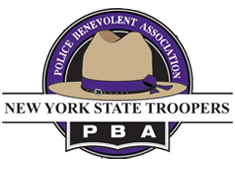The State Troopers PBA continues to make the public aware of the new scheme by the Division of State Police that would not allow Troopers to reduce traffic tickets at court. During interviews with members of television and print media, PBA representatives have explained the PBA’s views and pointed out why this is a misguided plan.
This directive will significantly debilitate both prosecutions and Trooper input into the disposition of the vehicle and traffic cases. In turn, this will severely impair highway safety by limiting the effectiveness of traffic enforcement by bottling up and harming the court system.
This will also dump more unfunded mandates on county District Attorneys, who would be forced to send Assistant District Attorneys to every village, town and city court in each county to prosecute these matters.
The PBA will continue to make the public aware of this situation, and will continue to fight this ill-advised plan. Below is a link to an article published in the Times Herald-Record of Middletown.
April 04, 2006
Trooper plea bargains to end
By Jessica Gardner
Times Herald-Record
jgardner@th-record.com
You know the routine.
Go into court with your traffic ticket clutched in your palm and wait for the state trooper who pulled you over a few weeks ago to call your name. Then you two begin a game of "Let’s make a deal."
And then …
POOF!
Your speeding ticket can, under the right circumstances, morph into an obscure charge of parking on the pavement.
No trial, a lighter slap on the wrist, and some town makes money off your reduced charge.
Everybody’s happy.
Except the brass at state police headquarters who recently decreed that troopers will no longer be allowed to make plea bargains as of Sept. 1. Instead, the county district attorney’s office (or some designee) will have to carry that burden.
"It’s repugnant to have police officers making plea bargains," said Glenn Valle, chief counsel to the state police, who added that the decree was just a reaffirmation of a policy that has been on the books for decades. "We are going to put an end to a system that is unethical and inequitable to motorists."
But what Valle calls unethical, some district attorneys and municipal justices call necessary to shoulder the heavy load of traffic-related cases that come through local courts.
State police Sgt. William Myers estimates that troopers issue 95,000 to 100,000 traffic summons annually in Troop F. That includes the counties of Rockland, Sullivan, Ulster, Orange and Greene. It’s impossible to quantify how many drivers end up pleading to lesser charges, but everyone agrees most of them do.
"It’s my duty and obligation to deal with these tickets and I intend to, but it’s going to require more manpower and resources," Sullivan County District Attorney Stephen Lungen said.
With only eight assistant district attorneys, Lungen doesn’t have the staff to cover the 36 village and town courts in Sullivan County. All told, he said, the change could equate to an additional 100 court appearances a month.
Ulster County District Attorney Don Williams echoed Lungen’s concern: "Adding vehicle and traffic tickets to the 16,000 cases we prosecute each year would be impossible, and I’m not inclined to ask the Legislature to add more staff."
Valle argued that additional manpower wasn’t needed. Instead, he said, other mechanisms could be created to handle the load, including a mail-in system for plea bargains.
Trooper Tom Mungeer, a local delegate to the troopers’ union, said the newest decree is another "unfunded state mandate" and it’s meant to save money in overtime.
In Valle’s letter, sent to every district attorney in the state last month, he said that plea bargaining was keeping troopers from necessary road time, but that overtime costs were not the primary motivation.
"There’s an inherent outward appearance of unfairness and duress when a motorist is forced to plea bargain with the very same officer who stands as his or her accuser," Valle said. "That’s the motivation."
Woodbury Town Justice David Levinson, who’s been on the bench since 1978, said he’s never seen any intimidation where plea bargains with troopers were concerned. Instead, he said that if a compromise is offered, the driver will take it.
Traffic fines
Here’s a list of the most common moving violations, their point values on a driver’s license and possible fines:
– Speeding (21-30 mph): 6 points, $60-$200 fine
– Inadequate brakes: 2 points, up to $150 fine
– Failure to stop for a school bus: 5 points, $250-$400 fineIf you receive 11 points or more on your driver’s license in 18 months, the Department of Motor Vehicles suspends your license.
For traffic infractions, such as parking on pavement or obstructed view, there are no points on your driver’s license. Below is a list of fines associated with those infractions:
– 1st offense: no more than $150
– 2nd offense (in 18 months): no more $300
– 3rd offense (in 18 months): no more than $400
Source: State Department of Motor Vehicles
Click here for a link to the Times Herald-Record of Middletown
